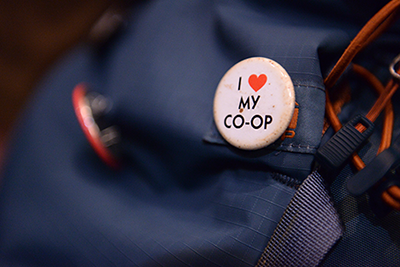
In this column, I’d like to address another perspective on cooperative identity: its connection to policymaking. The notion of “cooperative identity” can be a bit amorphous and cause some people to dismiss it as an academic exercise. I beg to differ. When we act on our co-op identity, people and their communities benefit in unique and tangible ways, and the government recognizes and treats co-ops distinctly.
That is why it is important that “Deepening our Cooperative Identity” is the theme for International Cooperative Alliance (ICA)’s 125th Anniversary World Cooperative Congress. It’s also our theme for this year’s Cooperative IMPACT Conference.
First, the basics. The phrase cooperative identity is a term of art that includes the definition of a cooperative (the what), the business model’s shared values (the why), and its principles (the how) as defined by the ICA. The cooperative identity makes it possible for people to have a shared understanding of just what a cooperative is so that we can have meaningful, productive conversations with people inside and outside the cooperative community. The cooperative identity can also inspire members and leaders of cooperatives to act differently so that co-ops yield better outcomes for their members and communities. Finally, when outside stakeholders—such as the government and prospective co-op members—understand that a business embraces their co-op identity, they will regard the co-op favorably.
The cooperative identity makes it possible for people to have a shared understanding of just what a cooperative is so that we can have meaningful, productive conversations with people inside and outside the cooperative community.
Let’s get concrete. Tax policy treats cooperatives in most sectors somewhat differently than other types of businesses. Typically, taxes are levied either on the business or the member, but not at both levels. Of course, this makes sense because the members—the people who use the business—are the co-op. These members own it, control it and, ultimately, benefit from its success. That is, the reason this tax treatment makes sense is because of key tenets of the cooperative identity: democratic control and member economic participation. Conversely, if co-ops do not act in a way consistent with their co-op identity, they increase the likelihood that the tax treatment for co-ops will change in an unfavorable way. So, it is important for co-ops to understand and act on their co-op identity. This part of the co-op identity—user ownership, user control and user benefit—is basically written into tax law already. If a business does not act consistent with this part of the co-op identity, it will not be treated as a co-op for tax purposes.
Let’s take another example. This one is not written into law, but still can very much affect the way policymakers and other outside stakeholders treat cooperatives. The cooperative values include equality, equity and solidarity. Generally, not as many people within the co-op community (much less outside it) know the cooperative values—as opposed to a general recognition of the principles. Yet these shared values have become especially relevant today with the way-overdue trend of more people, businesses and policymakers focusing on diversity, equity and inclusion (DEI).
Now more than ever, it is incumbent on cooperatives to understand their values, act on them and share examples with stakeholders inside and external to the cooperative community. Prospective members and policymakers need to understand that cooperatives, as people-centered businesses, have long held the key tenets of DEI in our DNA—or the co-op identity. When this distinct identity translates to behavior and broader understanding, then prospective members, the community and policymakers will treat cooperatives accordingly. What does that mean in terms of policy? It means that when policymakers are looking to address inequality and systemic racism through targeted technical assistance and financing, they will look to cooperatives as a natural partner to empower people in their businesses and communities. Or to put it another way, co-ops will be eligible for these new public dollars if they act on their co-op identity.
When policymakers are looking to address inequality and systemic racism through targeted technical assistance and financing, they will look to cooperatives as a natural partner to empower people in their businesses and communities.
To be sure, good things are happening in the cooperative community on the DEI front. For example, the credit union movement has created a group called the Credit Union DEI Collective devoted to expanding DEI within the credit union sector and “committed to the movement’s cooperative principles.” This action comes in the wake of a resolution by the Board of the Credit Union National Association in September 2019 to adopt DEI as an 8th cooperative principle. This is just one example of the forward action being taken by cooperatives across the sectors.
In October 2019, NCBA CLUSA’s Board of Directors adopted a resolution to increase the understanding and expression of DEI in the cooperative identity. Since that time, leadership at NCBA CLUSA has been working with the leadership of ICA by exploring, among other things, adjusting our cooperative principles to better align with our values that so clearly emphasize DEI. We will continue to work on this priority as the cooperative community looks to the World Cooperative Congress in December of 2021.
While good things are happening, more needs to be done. To accelerate and deepen DEI throughout the cooperative sectors, NCBA CLUSA and the Cooperative Development Foundation (CDF) are engaging in a two-year project supported by the Robert Wood Johnson Foundation that will include a survey of DEI practices across the cooperative community, a peer learning cohort, a report on best practices, and virtual and in-person convenings. This work builds on the 2020 Cooperative IMPACT Conference that explored how co-ops can build more inclusive local economies through the lens of DEI.
Whether through B-Corp certification or stakeholder capitalism, businesses are looking to show people that they act in ways that benefit workers, customers and the environment—not just investors.
The work around cooperative identity is perhaps more important now than ever as more and more businesses seek to distinguish themselves as socially responsible actors. Whether through B-Corp certification or stakeholder capitalism, businesses are looking to show people that they act in ways that benefit workers, customers and the environment—not just investors. As a cooperative community, we welcome others who have had the epiphany that businesses need to do more than just turn a profit. We welcome, that is, if they act consistently with their words.
As a cooperative community, we need to hold ourselves to the same standard. If we expect to be recognized and treated in distinct and favorable ways by policymakers, we must first understand and act consistently with our co-op identity. When we work together (cooperation among cooperatives) to embrace, act on and share our cooperative identity, good policy follows.
—Doug O’Brien is president and CEO of NCBA CLUSA, where he works with the cooperative community to deepen its impact on the economy.


